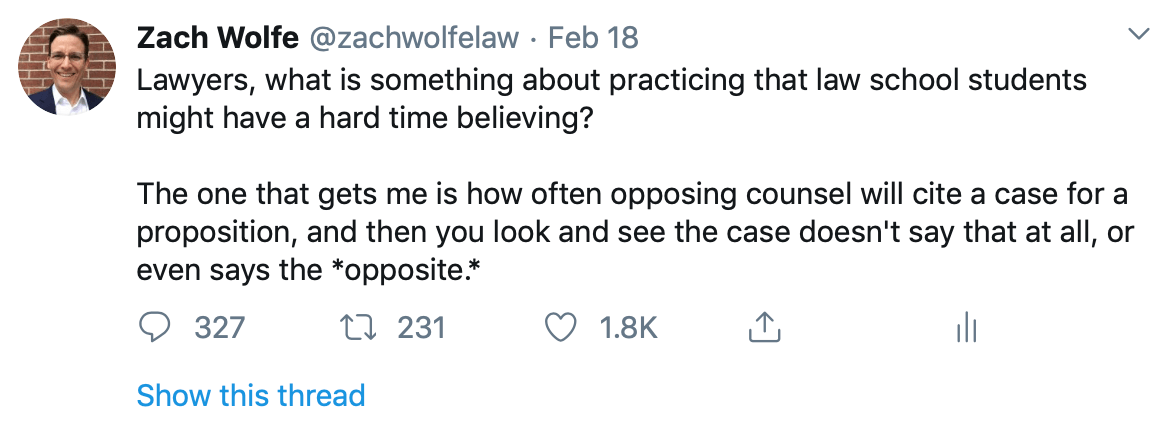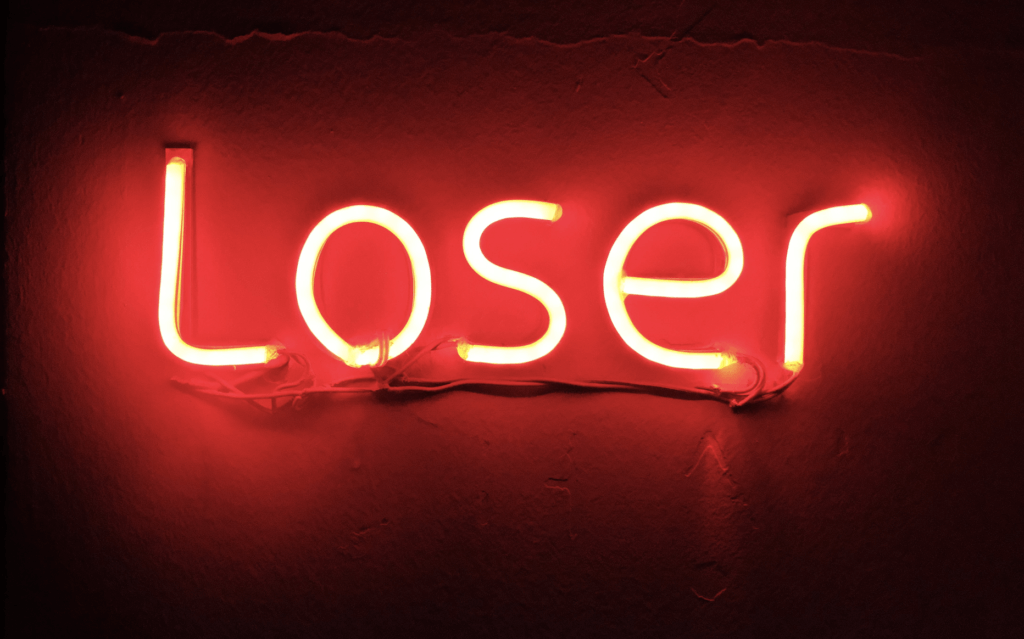Twitter is not all bad. One good thing about it is the opportunity for lawyers and law school students to interact. It gives the students a chance to hear what’s going on in the real world of law practice. And it gives lawyers a chance to do what they love best: talk about themselves and their jobs. You might call it “lawsplaining.”
A common law-Twitter trope: the law student expresses anxiety about exams, or interviewing, or student loans, and a snarky lawyer responds with something like, “You think your Property final is hard? Just wait until you’re a lawyer and your boss emails you at 10 pm saying he needs a motion for summary judgment researched, drafted, and on his desk by tomorrow morning!”
Yes, we lawyers tend to lay it on a little thick. So if you’re a law student following lawyers on Twitter, adjust your settings for “associate gallows humor,” “bitter senior partner venting,” and the like. And keep in mind that most of us lawyers like our jobs and the profession, even if we sometimes act like we’d rather have some horrible menial job, like accounting.
Plus, it’s hard to compare the existential dread of law school and the bar exam with the everyday headaches of practicing law. Sure, it can be a pain dealing with difficult clients, demanding bosses, irritable judges, billable hours, or bringing in business. But that’s more of a daily grind, and you get used to it. It’s not the same kind of scary as taking that Secured Transactions exam that will determine whether you will get a job or have to default on your student loans.
Not only that, you have to adjust for the experience and capabilities of the person experiencing the adversity. The Bible says God will not test you beyond what you can bear. Whether you believe that or not, in professional life your ability to handle stress does tend to expand as the tests become more challenging.
I mean, you wouldn’t say to your ten-year-old, “You think fractions are hard? Just wait until you have to get a job and pay a mortgage!” Or maybe you would. But the point is that lawyers shouldn’t try to make law students feel like they’re being wimps for complaining about how tough law school can be.
So, real law school students, take the pearls of wisdom you find on Twitter School of Law with a grain of salt. (Talk about mixed metaphors.)
But still, you can learn a lot from Twitter about what it’s really like to be a lawyer. I have firsthand knowledge of this. I recently tweeted the following:
I was serious. In law school, you wouldn’t dream of turning in a paper citing a case that didn’t support the proposition it was cited for. You certainly would not be so careless as to cite a case that said the opposite. So when I was a law student, I would not have expected real lawyers to do that.
But in the real world of litigation, this sort of thing happens more often than you would think.
It was just an offhand comment, but my tweet went viral (at least by my standards). Over 200 retweets, almost 2,000 likes, and over 300 comments.
The comments were really the best part, although some people seemed to misunderstand the question. The question was about what would surprise law school students, not just “what is something about law practice that you would like to gripe about?”
But still, the responses were fun to read. Some were funny, some insightful, and most of them had a nugget of wisdom.
They were so good that I decided to select the top 50. Now, keep in mind, my goal here was to select things that struck me as both true and unexpected. So if you responded with some unparalleled wisdom that didn’t make the cut, maybe I just thought your point would not be that hard for a law student to believe.
As I selected the top 50, I noticed two things. First, there were some discernible recurring themes. Second, most of the comments were, shall we say, a little on the negative side? So, I’ve grouped the responses by theme, and where needed I’ve offered a counterpoint accentuating the positive.
Law school vs. law practice
1. “The practice of law is way more stressful and demanding than the study of law once prickly senior partners, combative opposing counsel, fearsome judges, and difficult clients are part of the picture.”
2. “Grades don’t matter in practice. Once your in the profession, how well you did means nothing when it comes to how you will do at your job.”
The first response is the typical one I mentioned earlier, although said in a nicer way. And it has a point: practicing law is more demanding than law school, at least in absolute terms. But don’t despair. You have to look at it in relative terms. With more experience under your belt, you’ll be able to handle it.
And here’s some news that may lighten the load of exams: Law school grades do make a difference in getting that first job offer, of course, and low grades may cut off some elite career paths. But for the most part, nobody is going to care about your law school grades after you get that first job.
BigLaw is great, but . . .
My impression is that BigLaw sucks up most of the recruiting oxygen on law school campuses. Still, as these comments point out, don’t think that working for a big law firm is the only worthwhile career path.
3. “That some of the best (and happiest) lawyers work for government agencies. They become experts in their fields. And although they won’t get rich, they make a comfortable living, have healthcare and guaranteed retirement, and go home at a reasonable hour.”
4. “That working for a smaller firm can get you way better mentorship sometimes and as such be better for your better for your career in the long run.”
5. “That quite often, the only advantage that a BigLaw firm has over a solo is the ability to marshal large numbers of (hourly billing) attorneys. That the underlying work sometimes is done better by the solo.”
On the other hand, big law firms hire a lot of students out of law school, and that’s where the money is. Plus, as I conceded in my post Should Clients Pay a Premium for Big-Name Law Firms?, most of the superstar lawyers are at the big firms. So it’s only natural that law students focus on them.
Law is messier than you think
6. “That fact patterns aren’t give to you in a neat, digestible format. You must pull the facts from your client and other witnesses (often, on multiple occasions) and organize them yourself.”
7. “That there is not going to be authority providing neat answers to many/most questions you are researching. So many of the issues we have to deal with are in grey areas, and I don’t think law school prepares you for that.”
8. “Managing ambiguity is part of the job. Sometimes, there’s no clear answer or path to recommend to your client.”
9. “The ethical issues that arise are not usually defendants admitting crimes or telling you where the bodies are. They are often relatively small, easy to miss instructions to do something that you might not immediately realize is unethical.”
The theme here is that law–and legal ethics–are messier than your meticulous outlines. On the other hand, you might be surprised how often you find yourself recalling and applying concepts you learned even decades earlier in law school. So those lessons do have value. Just don’t expect them to give a you a definitive answer all the time.
So much work, so little time
10. “That projects that take half a semester in law school you’ll have to do 2-3 every day.”
11. “How little time there is to do a lot of the work.”
It’s true. That motion for summary judgment you spent a semester on in law school? You might have one night to write it. But again, it’s ok. As the amount of work increases, your capacity for doing the work will increase too.
It’s not all sophisticated legal analysis
12. “My assumption in law school that I’d do a lot of talking as a lawyer was correct, but I though more of it would be in the courtroom. In reality, it’s mostly from my office on the phone. Sometimes I feel like I work at a call center. Dozens of calls a day, 30-60 min. ones are common.”
13. “That a strict system of file organization and client contact tracking heads off 90% of potential problems.”
14. “How far basic things like good record keeping and calendaring will get you. You can write amazing briefs, but if you’re always filing them late that’s going to catch up to you.”
15. “Transactional lawyer here. First, the amount of managing a project needed to get a deal done (vs anything having to do with the law). Second, the use of forms.”
16. “You may well spend days, even weeks completing administrative tasks.”
17. “How much of practice isn’t obvious from reading the rules. For example, how do you get the court to actually consider the motion you just filed and rule on it? In federal court, you sit and wait. In state court, you often have to get on a hearing calendar somehow.”
Law school doesn’t teach you much about practical office skills or internal court procedures. I don’t have a problem with that. Law schools focus on teaching substantive areas of law, because that’s what law schools are good at. Just don’t let that make you think you’re going to spend all your time focused on the law.
It takes a village to raise a baby lawyer
18. “Admins run everything, they all talk, and woe to the baby lawyer who runs afoul of the Admin Network.”
19. “The most important person at your law firm is probably a paralegal.”
No, you don’t want the secretaries and legal assistants mad at you. But if you’re lucky (like me), you’ll get to work with some great non-lawyers who will make your work life so much easier.
Respect your elders?
20. “That the amount lawyers charge has little to [do] with their level of skill or competence.”
21. “That a lot of attorneys who have decades of experience over you doesn’t mean they are better or know what they are doing.”
22. “You will come across senior lawyers, some of them prominent and respected, whose affidavits would get a failing grade in law school.”
23. “That the fact that someone has been practicing for a long time does not mean that they know what they are doing.”
Yes, you will discover that the most prominent or most senior lawyers sometimes have mediocre practice skills–or worse. But don’t disrespect the old folks. I have found that I can learn something valuable from almost every experienced lawyer I encounter. And the really good ones can teach you everything you need to know if you pay attention.
Judges
24. “That judges often don’t read one’s impeccably drafted and cite-checked briefs prior to hearings.”
25. “How many judges were terrible lawyers, then always brag about how great they were once on the bench.”
26. “How absolutely ordinary judges are.”
27. “I was really surprised to hear how much judges talk to other judges about attorneys that appeared in their courtroom. If you were disrespectful or respectful, judges talk to each other about that. A LOT.”
In law school I had an image of judges as the most experienced and esteemed lawyers who went on the bench after successful careers in litigation. The reality is that many judges are judges because they are good at politics, not because they are good at practicing law.
But there are still some really good ones. Given the system we have–elections for state court judges (at least in Texas) and federal appointments based on political connections –it’s a pleasant surprise how many excellent judges there are, especially when you consider they could make 3X more money in private practice (at least).
And regardless of what you think of the judge, follow the rules and be respectful. Word gets around.
Nice guys finish last?
28. “That you will actually get along with, and at times develop friendships with opposing counsel and more surprisingly, it’s almost always a good thing and benefits your client.
29. “Opposing counsel can be an ally. No need for snark. Civility can win.”
30. “How often you end up engaging in respectful conversations with opponents as you resolve disputes! I wish this was featured more in law school to counteract the popular notion that lawyers go around screaming at everyone who doesn’t share their position.”
Finally, some warmer, fuzzier responses. As these tweets indicate, don’t let TV and movies–or a fierce mock trial competition–convince you that the best lawyers treat opposing counsel like dirt.
90% of law practice is showing up?
31. “The awful work product you’ll come across from opposing lawyers, generally. Or the discovery abuse that is never addressed by the court.”
32. “That legal writing assignment that you got a C+ on is probably better quality than 90% of stuff that lawyers file.”
33. “That if you do simple things like show up for court, prepare, answer phone calls from your client, keep up with deadlines, and refrain from actively trying to screw over your client, you will instantly be in the top 10% of lawyers in your city.”
This may be a little exaggerated. But it’s true that after working so hard in law school, you will probably be surprised at how much bad lawyering is out there. So take the job seriously and take care of the fundamentals, and you will already be ahead of the game.
Difficult clients
34. “Sometimes people will be literally angry that you won’t do that legal task for free.”
35. “Despite the fact that you, the lawyer, with your education and practical experiences, are instructing them to do X, they will invariably state that you are wrong and they will do Y. They will then get upset (at you) when Y blows up in their face. Paper your advice folks.”
“Invariably” might be too strong. But you will be surprised how often a client will pay you $400 an hour (or whatever) for your expertise and then want to ignore your advice. On the other hand, it can be very gratifying when a client does trust your advice.
Will justice be done?
36. “You will lose. You can be right on the law, you can have justice on your side, you can write the most gorgeous brief, opposing counsel can do a lousy job… and the judge can go against you and there’s nothing you can do about it.”
37. “A winning argument is sometimes a losing argument when made by a no-name firm. A losing argument is sometimes a winning argument when made by a silk stocking or local firm.”
Sometimes judges and juries just get it wrong. And sometimes you will lose because of favoritism, not the merits. But overall, if you do your best work for every client, in the long run the overall results will be good.
Discovery, rules, and deadlines
38. “The lack of control over the discovery process by the courts despite the pretty detailed rules re timing and sanctions for ignoring said rules.”
39. “As a litigator: That some courts don’t give a single goddamn about schedules or rules.”
You can learn all the rules for discovery and other pretrial matters, but they’re not set in stone. This was another recurring theme. Still, if you play by the rules and meet your deadlines, you will be in a better position to get good results for your client.
Emotional intelligence > legal intelligence
40. “How much of your job is managing personalities.”
41. “If two people describe a situation completely differently, it doesn’t mean either one is lying. You’ll get much further if you assume both are trying their best, and think hard about how each one could see it that way.”
42. “How often even large ‘sophisticated’ corporate clients make litigation decisions based on emotion (usually pride or arrogance) rather than cold hard reason. Starting out you tend to think this is only how family law clients behave. Decisions still made by people.” [Ok, full disclosure: this was mine.]
It can be frustrating when clients make bad decisions based on emotion. But part of your job as lawyer is to put yourself in the clients’ shoes and understand where they’re coming from. Be glad that your clients are not robots.
Business skills vs. legal skills
43. “This doesn’t apply to every lawyer, but for many: customer service skills >>>>> legal skills.”
44. “Practicing law is not the business of law. You have to know and do both. Hard work does not equate with success.”
45. “A corollary to yours, but there are an awful lot of successful lawyers who are great at business development, handwaving, speechifying, etc., but just really terrible at lawyering.”
46. “The huge amount of time, effort and money to market your practice. And that marketing is almost as important as the practice of law these days.”
47. “Unless you have an amazing mentor/rainmaker who takes you under their wing and transitions clients to you, you need to start networking and building a book from day one. Stellar legal work is not enough.”
Oh man, that last one hit me hard. I was clueless about that sort of thing when I came out of law school. I thought I was just not the “rainmaker” type, so I would focus on doing the client work. But that was unwise.
You will enjoy the practice of law a lot more if you bring in your own clients, and you need to start developing the skills to do that from day one. Law schools are not going to teach those skills, and it would be folly for them to try.
The good news is that you can learn those skills. Find yourself a mentor if you can, or at least follow some rainmakers on Twitter.
And now for the true wisdom . . .
48. “Wait, law students wouldn’t believe that? What, did they not do article review for their journals?”
49. “Despite depictions in ads and website photos, you would be surprised to learn that lawyers rarely stand around with their arms crossed.”
50. “Some associates take bathroom breaks. Stunning to me. I didn’t go until my 8th year.”
These responses actually made me lol.
See, I told you Twitter isn’t all bad. Now, Facebook? Facebook sucks.
________________________________________

These are his opinions, not the opinions of his firm or clients, so don’t cite part of this post against him in an actual case. Every case is different, so don’t rely on this post as legal advice for your case.




Comments:
Great article Zach! There is a lot of good advice here.
Thanks for reading!